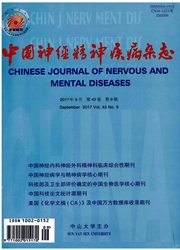

 中文摘要:
中文摘要:
目的探讨原发性或隐源性癫痫儿童注意网络状况及临床影响因素。方法对46例原发性或隐源性癫痫儿童和42名正常儿童进行注意网络测验,比较两组间注意网络水平指标的差异,并采取相关分析和多元逐步线性回归分析年龄、起病年龄、病程等因素对注意网络各测试指标的影响。结果原发性或隐源性癫痫儿童执行控制反应时间较正常儿童明显延长(P〈0.05)。总体平均反应时间两组也存在明显差异(P〈0.05)。受教育程度是影响执行控制反应时间和总体平均反应时间最显著的保护因素(P〈0.05)。而疾病相关因素中的起病年龄是影响注意执行网络的显著因素(P〈0.05)。结论原发性或隐源性癫痫儿童注意网络存在选择性的执行控制功能损害。受教育程度对患者注意具有保护作用,起病年龄是影响患者注意网络水平的显著疾病相关因素。
 英文摘要:
英文摘要:
Objective To study the attentional networks of children with newly diagnosed idiopathic or cryptogenic epilepsy and the disease-related factors. Methods A computerized battery of tasks comprising Raven's Standard Progressive Matrices (SPM) and Attention Network Test (ANT) were used to evaluate attentional networks of children. Correlation analysis and stepwise multiple regression analysis were performed to examine the relation of the scores for the ANT with age, age at onset, duration of epilepsy. Results Children with newly diagnosed idiopathic or cryptogenic epilepsy showed a significant selective deficit in the executive control network. There was also a significant difference in the overall mean reaction time between children with and without epilepsy. Moreover, Education was the most significant factor affecting on the scores for executive control and overall mean RT. The age at onset was the significant factor affecting on the scores for ANT in the diseased-related factor. Conclusions Our study suggests that children with newly diagnosed idiopathic or cryptogenic epilepsy have selective impairment of attention network of executive control and that the education and the age at onset have significant impact on the attention of children with epilepsy.
 同期刊论文项目
同期刊论文项目
 同项目期刊论文
同项目期刊论文
 期刊信息
期刊信息
